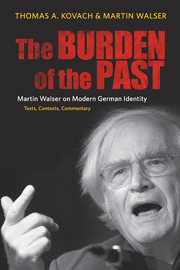Book contents
- Frontmatter
- Contents
- Acknowledgments
- The Burden of the Past
- Introduction
- Our Auschwitz (1965)
- No End to Auschwitz (1979)
- Handshake with Ghosts (1979)
- Speaking of Germany (A Report) (1988)
- Experiences while Composing a Sunday Speech: The Peace Prize Speech (1998)
- On Talking to Yourself: A Flagrant Attempt (2000)
- Conclusion
- Suggestions for Further Reading
- Index
No End to Auschwitz (1979)
Published online by Cambridge University Press: 05 February 2013
- Frontmatter
- Contents
- Acknowledgments
- The Burden of the Past
- Introduction
- Our Auschwitz (1965)
- No End to Auschwitz (1979)
- Handshake with Ghosts (1979)
- Speaking of Germany (A Report) (1988)
- Experiences while Composing a Sunday Speech: The Peace Prize Speech (1998)
- On Talking to Yourself: A Flagrant Attempt (2000)
- Conclusion
- Suggestions for Further Reading
- Index
Summary
Context
IN 1965, WHEN WALSER WROTE HIS ESSAY “Our Auschwitz,” he was becoming increasingly involved in politics, initially through the Social Democratic Party (SPD). Then, when he and other left-wing intellectuals grew increasingly frustrated in the late 1960s with the German government's cooperation with the US war effort in Vietnam and the SPD's failure to offer effective opposition to this policy, he became associated with the “Extra-Parliamentary Opposition” (APO) and even flirted with the German Communist Party. This development was given further impetus by the “Grand Coalition” of 1966 to 1969, in which the Social Democrats (led by Willy Brandt) joined in a coalition with the Christian Democrats, under the leadership of Kurt Kiesinger, the West German Chancellor, who had been a member of the Nazi Party. Ironically, given that his political engagement around this time took the form of opposition to American policies, it is widely thought that it was his sojourn in the United States in the late 1950s that brought him out of his relatively apolitical stance of the 1950s and convinced him of his obligation as a writer and public intellectual to speak out on political issues. The stance he adopted in the 1965 essay can be viewed as symptomatic of his assuming the role of a public intellectual commenting on political and moral issues of concern to his society. His left-wing political outlook was reflected in his novels and plays during these years, which often featured individuals whose lives were controlled in destructive ways by the ruling economic and political power structure.
- Type
- Chapter
- Information
- The Burden of the PastMartin Walser on Modern German Identity: Texts, Contexts, Commentary, pp. 23 - 34Publisher: Boydell & BrewerPrint publication year: 2008



